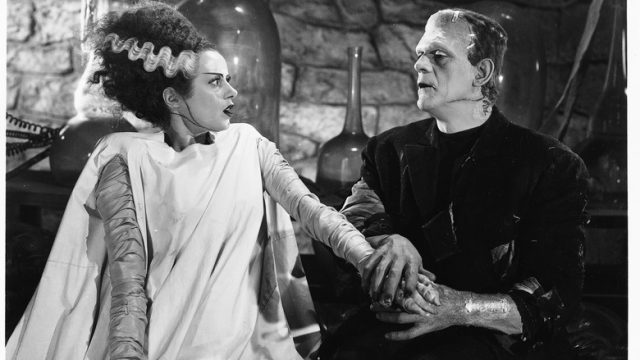Bride of Frankenstein is a considerable step up from its predecessor. While Frankenstein plodded–or shambled, if you’d prefer–Bride of Frankenstein is fleet of foot, with director James White deploying the same camp, wit, queer subtext, and outsider sensibility that make his The Old Dark House such a classic.
Bride picks up where its predecessor left off … but one step removed, beginning with earnest edgelord Lord Byron enchanted and astonished at the depths of darkness the seemingly decorous Mary Shelley (Elsa Lanchester) has conjured up. Lanchester plays Mary with a cool, amused remove, fond of Byron but contemptuous of him nonetheless: why shouldn’t she know, and imagine, as much about depravity as anyone? This one scene is enough to make you wish Lanchester had gone on to play Miss Marple. (But alas, only the satiric “Miss Marbles.”) She gathers Byron and the besotted Percy Shelley ’round and continues her tale.
Right from the start, it’s more ruthless and more sharply characterized than the first film, as Frankenstein’s monster survives the burning of the mill only to quickly and intentionally dispatch both parents of the little girl he’d accidentally drowned. His motives are still tied to survival, but hesitation–and the need to be terrified and brutalized into rage–is a thing of the past. The movie follows his ascent (?) into a more complex but more flawed humanity.
Taken in by a blind and desperately lonely hermit (O.P. Heggie), the monster learns rudimentary language and the pleasures of company, affection, and compassion. Not willing to completely surrender to this segment’s earnestness, Whale makes sure he learns the pleasures of a good drink and a good smoke, too. Those are, the film even suggests, possibly the more enduring delights. Outsiders will always end up outside, and to be profoundly unwelcome and unwanted is to be buried alive–but you can sometimes muster the campy defiance necessary to have a picnic in a tomb.
The monster comes to understand that, too, in his way. He’s been a whipped dog, then an innocent child, and he’s finally becoming a man, capable of imagination and understanding. He knows what his brief lifetime of being scorned, feared, and terrorized has done to him: “I love dead. Hate living.”
“You’re wise in your generation,” says Dr. Pretorius (Ernest Thesinger), our picnicker in the tomb. Pretorius–wry, cynical, and amoral–is a one-time mentor of Frankenstein’s, a mad scientist with more precision and bitter whimsy. He excels at making homunculi, small-scale replicas of humans, and keeps them acting out tempests in their separate teapots, but he’s never made anything on Frankenstein’s scale. (Pretorius is queer-coded, and part of that manifests in his scientific “art,” which is impressive but somehow unacceptable, too delicate, too theatrical; it has to be stoppered up and hidden away.) He wants to partner up with his former protégé to make the creature a bride (Lanchester again), and if that means resorting to intimidation and kidnapping, well, why not? Thesinger easily steals the show here with his Alan Cumming-like performance and sunny nihilism (he and the world share low opinions of each other). And for all Pretorius’s faults, he understands himself in a way the wishy-washy Frankenstein (Colin Clive) never does.
Frankenstein pretends to be the good guy, but leave him to stew in his own angst for a moment, and you get lines like this: “I created a man, and who knows, in time, I could have trained him to do my will. I could have bred a race.” He’s whiteness and Empire in miniature, longing to run unchecked while whining about his feelings, and compared to where all that has gotten us, Pretorius seems relatively tame in comparison. You sense that Whale knows it, but he’s not making a movie about good and evil. If Mary Shelley opens the film by talking about man’s hubris in playing God, Bride of Frankenstein explores what is, to Whale, the more poignant and wrenching issue of trying to play society. How long, really, can you picnic among the graves? Can you really build a world of other unwelcome outsiders? Or will it always burn down in the end?
Bride of Frankenstein is available on Peacock and the Criterion Channel.


